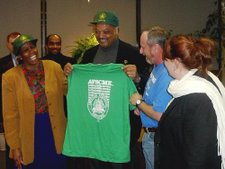
AFSCME Local 965 has been pushing for years for a convenient, high-quality child care facility on our campus, but Chancellor John White failed to respond. We commend Chancellor G. David Gearhart for his support of the important project and express our appreciation to Trustee John Tyson for this generous gift to help working families seeking an education at the University of Arkansas.
The availability of affordable, high-quality childcare is a huge need across the country. Equipping child development educators with the skills to positively impact future generations through their work is just as essential. Now, thanks to a $2.5 million gift from the Tyson Family Foundation and the Tyson Foods Foundation, the University of Arkansas will be able to better join these two needs through the creation of a unified Child Development Center, an educational training facility on campus. With approval of the University of Arkansas Board of Trustees, the new center will be named the Jean Tyson Child Development Center, in honor of the matriarch of the Tyson family.
“For years, the need for a better training facility and campus childcare option has been articulated by faculty, staff and students,” said Chancellor G. David Gearhart. “We are delighted that this wish will soon become a reality on our campus with the creation of a new experiential laboratory where tomorrow’s practitioners and leaders in child development and childcare will obtain their education – while providing the best possible head start to infants and preschoolers.”
;“On behalf of my sisters Cheryl and Carla, and my children John Randal and Olivia, let me say how pleased we are to be able to honor our mother and support this very important project on the University of Arkansas Fayetteville campus,” said John Tyson. “My mother, who passed away in 2006, would be delighted to have this facility, dedicated to the education and training of childcare workers and educators, named for her. Quality childcare has become so important to companies and families across our state and nation, and the work that will take place in this facility will make a contribution in this field for years to come.”
Currently, the campus offers an Infant Development Center and a Nursery School through the School of Human Environmental Sciences in the Dale Bumpers College of Agricultural, Food and Life Sciences. Both the Infant Development Center and the Nursery School are vital to students and faculty who need childcare, and important to students who study child development, nursing and early childhood education and obtain valuable experience in these learning labs. Both facilities, while able to attain national accreditation from the National Association for the Education of Young Children, are currently inadequate. The Nursery School faces severe space limitations. The Infant Development Center, constructed for a completely different purpose in the early 1970s, has been maintained solely as a temporary facility and has space issues and cannot continue to meet health and safety regulations without extensive renovation. The reality that these two centers are on opposite sides of campus presents further logistical and practical challenges for students, faculty and clients as well.
This gift will help construct one larger state-of-the-art learning facility, with classrooms, indoor and outdoor play spaces and an adequate observation room, where university students gain valuable insight into the behavioral and developmental patterns in children. The new center will provide an outstanding facility to meet the educational and research needs for an increasing number of students majoring in human development, family sciences and rural sociology, while expanding childcare options for the campus and community. The size and scope of the center have not been finalized, and additional funding will likely be needed. Revenue from the expansion will, however, help to support the facility.
“This gift couldn’t come at a better time,” said Michael Vayda, dean of the Dale Bumpers College of Agricultural, Food and Life Sciences. “The center will provide acutely needed childcare services for University of Arkansas staff, faculty, students and community members, as well as providing the premier site for training our students as professionals for statewide service in the care and nurturing of children, and an observatory for faculty experts to develop best practices in promoting school readiness, emotional well-being and healthy interpersonal relationships.”
The Jean Tyson Child Development Center will provide educational and research opportunities for more than 300 University of Arkansas students, faculty and children each year and will meet the childcare needs of more than 140 families from the campus and community, Vayda said.
“The number of undergraduate students has increased and to ensure quality experiences, we must have enough room to accommodate enrollment,” said Vernoice Baldwin, instructor and director of the university’s Infant Development Center and Nursery School. “The two-year colleges in the state have seen an increase in the number of students enrolled in child development, and we anticipate many of these students will have a need for a four-year baccalaureate degree. We want to be prepared for the greater demand in laboratory facilities to meet those needs,” said Baldwin.

































